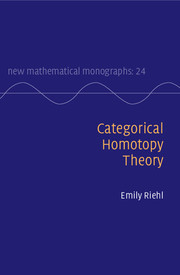Preface
Published online by Cambridge University Press: 05 June 2014
Summary
The viewpoint taken by William Thurston's essay – that mathematical progress is made by advancing human understanding of mathematics and not only through the proof of new theorems – succinctly describes the character and focus of the course that produced this book. Although certain results appearing in this volume may surprise working homotopy theorists, the mathematical content of this text is not substantially new. Instead, the central value of this account derives from the more qualitative insights provided by its perspective. The theorems and topics discussed here illustrate how categorical formalisms can be used to organize and clarify a wealth of homotopical ideas.
The central project of homotopy theory, broadly defined, is to study the objects of a category up to a specified notion of “weak equivalence.” These weak equivalences are morphisms that satisfy a certain closure property vis-à-vis composition and cancellation that is also satisfied by the isomorphisms in any category – but weak equivalences are not generally invertible. In experience, it is inconvenient to work directly in the homotopy category, constructed by formally inverting these maps. Instead, over the years, homotopy theorists have produced various axiomatizations that guarantee that certain “point-set level” constructions respect weak equivalences and have developed models in which weak constructions behave like strict ones. By design, this patchwork of mathematical structures can be used to solve a wide variety of problems, but they can be rather complicated for the novice to navigate.
- Type
- Chapter
- Information
- Categorical Homotopy Theory , pp. xi - xviiiPublisher: Cambridge University PressPrint publication year: 2014



